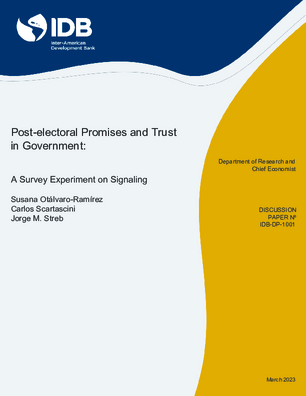Post-electoral Promises and Trust in Government: A Survey Experiment on Signaling
Date
Mar 2023
Transparency initiatives are well-known tools introduced to foster trust and empower citizens. To explain why some governments introduce them but others do not, in a theoretical model we interpret these initiatives as a signal that complements the information already provided by visible government performance. To analyze how citizens react to these initiatives, we conducted a randomized survey experiment in the City of Buenos Aires, Argentina, where the incumbent mayor made a set of post-electoral promises. Our results show that post-electoral promises matter in shaping citizens perceptions about the trustworthiness of the government. We find strong heterogeneity among three groups of citizens. A group unfamiliar with the policy was impervious to treatment: they seem to react to deeds, not words, and have low trust on average. The treatment effects are entirely through those vaguely familiar with the promises, closing the average gap in trust with those familiar with the promises. More generally, our study suggests that transparency initiatives may be an effective signal in a setting with some initial trust. Still their informational value may be more limited than visible public performance.




